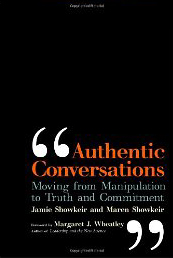LEAN INTO VULNERABILITY TO ACHIEVE AUTHENTICITY
Brené Brown is a self-described “researcher storyteller,” with a PhD in social work. She has spent the last decade studying and doing research on vulnerability, courage and authenticity.
“Connection is why we are here,” she said in a recent TED speech, which was recommended to us by a friend and fellow traveler on the road to authenticity. “[Connection] is what gives purpose and meaning to our lives.” And connection requires authenticity, Brown’s research shows.
Here’s why: One of the main qualities that separate those who have a strong sense of love and belonging from those who don’t is a willingness to be truly seen. These are people who can let go of who they think they should be and be real about who they are. They have learned to embrace vulnerability, which Brown says is absolutely essential for connection.
Embracing vulnerability is also essential to having authentic conversations. Enduring relationships characterized by trust, respect, acceptance, and compassion begin with willingness to be vulnerable. To achieve true connection, you have to live without guarantees. You must invest in relationships that might not work out.
Brown also connects her research to the vitriolic nature of our public conversations, particularly in politics and the media, because the fear that gives birth to vulnerability tends to get cloaked in desperate uncertainty.
Our need to wall off fear and vulnerability inspires us to transform uncertainty into certainty, whether it’s about religion, politics or personal philosophies. Blaming others becomes the easiest way to discharge discomfort. We retreat into mindsets of “I am right. You’re wrong. Shut up.”
The antidote to this requires developing an appreciation of our vulnerabilities and the courage to snuggle up to them. Truly connecting with others — colleagues, children, partners, and friends — require most of us to develop new skills, Brown says.
The price we pay for our lack of authenticity is steep, because we shut ourselves off from what is real. We scurry to find ways to numb ourselves to painful emotions. But because it is impossible to selectively shut down emotions, we also disconnect from our compassion and joy. In the worst cases, we turn to destructive habits and unhealthy addictions.
Everyone shares a desire for clarity around who they are, and the confidence to share that with others. It is one more reason to develop the skills and commitments required for authentic conversations.
“When we work from a place that says, ‘I am enough,’ we stop screaming and start listening,” Brown says. “Because we are kinder and gentler with ourselves, we can be kinder and gentler with other people.”
Written by Maren and Jamie Showkeir
Owners of henning-showkeir & associates, inc., and co-authors of Authentic Conversations: Moving from Manipulation to Truth and Commitment.


 maren
maren